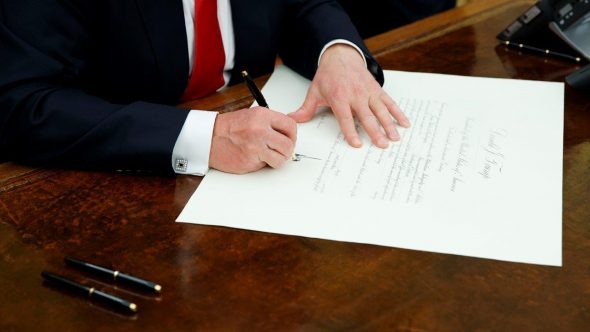As the lawsuits, dramatic late night court orders, and protests coalesced around the country in opposition to President Trump’s executive orders on immigration, I hope you, like me, took heart from the resolve and spirit of the protesters, the generosity of the principled lawyers who rushed to help people whom the orders hurt, the widespread resistance to an assault on the spirit and character of the United States.
As events unfolded, I obsessively hit refresh in my browser, jumping between tabs to catch updates from various outlets. And I was struck by how many of them reported that the president had curtailed rights “with the stroke of a pen.”
There are plenty of things to criticize about the phrase. First, it’s a cliché, and it’s enough to object on that basis alone.
It stands out as unusual for news reportage, even today, in the era of post-blog journalism. There are some places where we expect point of view and colorful literary flourishes. But this was in news reportage, not in news analysis, an editorial, a column, or an op-ed. It was unusual enough to make my ears perk up.
But there’s something something deeper here that bothers me. Rhetorically, “the stroke of a pen” sets up a contrast between how trivially easily it is to issue an order and how life-alteringly hard it is to withstand its consequences. This is meant to cast issuing the order in a very bad light, considering the grossly disproportionate suffering those deeds cause.
I think it fails at this, partly because the cliche—and the cheap sentimentality that attends it—obscures the nature of the office. The president is an executive—it being the Executive branch I suppose the president is the Executive executive. We all laughed at George W. Bush called himself “the decider,” but he wasn’t wrong: The president supplies leadership, takes advice, fields bills or policy proposals, and bestows approval on documents by signing them. This is how it’s supposed to work.
Let me put it another way: Almost everything the president does, good or bad, is “with the stroke of a pen.” The pen isn’t the issue.
More to the point, I think it misplaces focus. Yes, the executive order is inhumane. Yes, I think it’s bad policy. Yes, if reports are to be believed it was an example of mind-bogglingly incompetent management and governance. But focusing on the “stroke of a pen” elides all these legitimate criticisms, and elides to some extent the experience of the people the order affects, and replaces these more nuanced and frankly more damning analysis with a facile, clucking disapproval of the callow ogre and his thoughtless cruelty.
Desperate times don’t call for desperate metaphors. As this story develops, I hope I don’t have to write again about a “‘full-blown’ constitutional crisis” as if an only partially blown one would somehow be OK.

